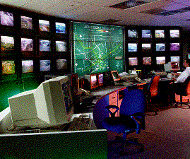3/16/2016
States Advance License Plate Reader RestrictionsAlabama, Massachusetts, Missouri and Oklahoma consider legislation limiting use of license plate cameras.

A number of states are having second thoughts about automated license plate readers (ALPR, also known as ANPR in Europe). On Monday, the Oklahoma Senate voted unanimously in favor of restrictions on police use of motorist information. Plate readers, which have come into wide use across the country, allow local police to share real-time tracking information on any motorist with other departments and federal agencies.
Under the proposal put forward by Oklahoma state Senator Nathan Dahm (R-Broken Arrow), such sharing would be prohibited and the plate data would have to be destroyed at the end of fourteen days unless a government entity applies for a court order to preserve the data.
"A governmental entity or defendant in a criminal case may apply for a court order for disclosure of captured plate data, which shall be issued by any court of competent jurisdiction if the governmental entity or defendant in a criminal case offers specific and articulable facts showing there are reasonable grounds to believe the captured plate data is relevant and material to an ongoing criminal or missing persons investigation or criminal prosecution or defense," Senate Bill 1144 states.
Dahm's bill does not stop at that restriction, however. It also includes explicit authorization for meter maids to use license plate cameras to help issue parking tickets, for toll road companies to issue citations and for police to issue tickets for expired registrations.
Later today, the Missouri Senate Transportation Committee is scheduled to hear testimony on a similar license plate reader restriction bill. The measure introduced by state Senator Will Kraus (R-Lee's Summit) allows detectives to access license plate data, but it must be destroyed after thirty days unless a request for preservation is made to a judge. Misuse of plate data would be classified as a class D felony, punishable by up to a year in jail and a $5000 fine.
License plate camera restriction bills have also been introduced in the Alabama and Massachusetts legislatures, but they have yet to advance. All of the bills, including Oklahoma and Missouri's proposals, include a requirement that public agencies create a publicly available privacy policy governing the use of license plate readers. The California legislature enacted a privacy policy law for license plate cameras last year (view bill).
A copy of the Oklahoma legislation is available in a 70k PDF file at the source link below.


